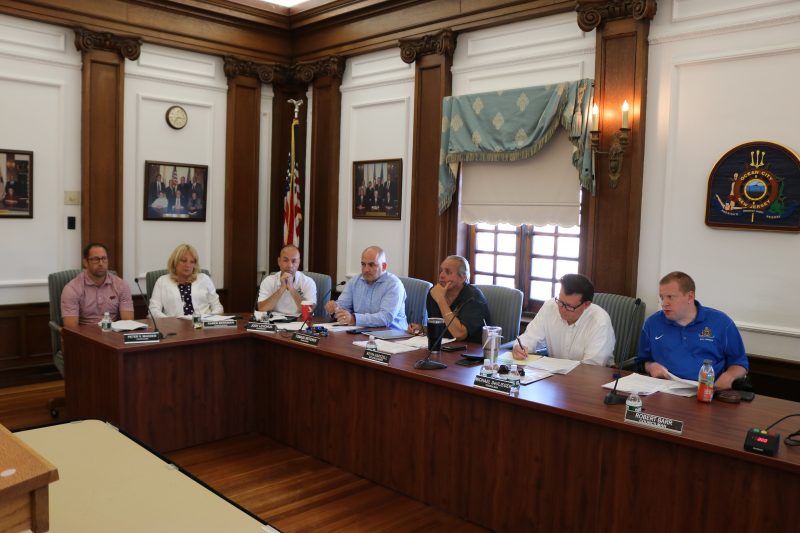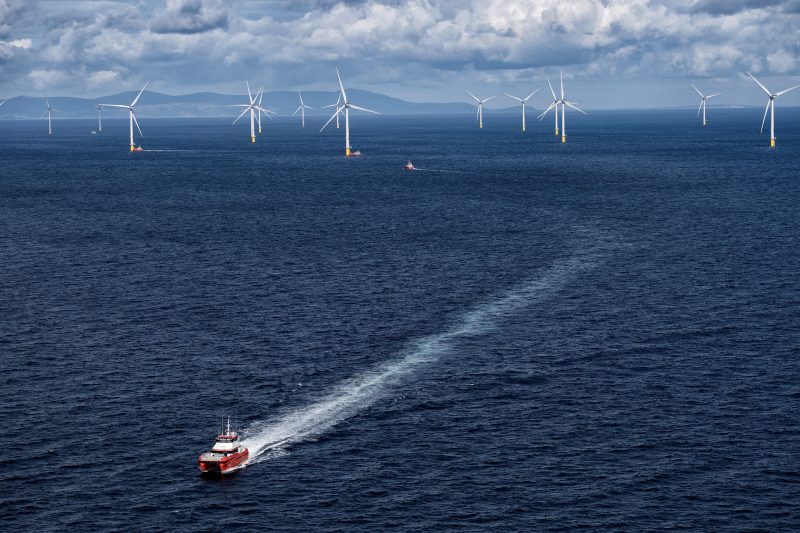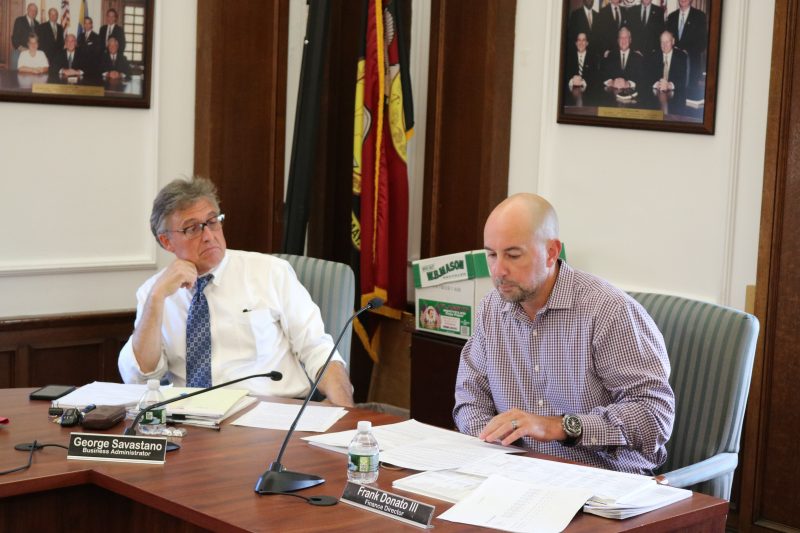In a 7-0 vote, City Council approves a resolution that denounces state legislation to eliminate local control over the proposed wind farm off the South Jersey coast.
 By DONALD WITTKOWSKI
City Council on Thursday night blasted state legislation that would speed up development of a proposed offshore wind energy farm as a blatant power grab that strips Ocean City and other local communities of New Jersey’s longstanding tradition of home rule.
“Essentially, they’ve taken our right to home rule away from us,” said Councilman Michael DeVlieger, the governing body’s most outspoken critic of the wind farm project.
In the latest salvo by Ocean City opposing the wind farm, Council voted 7-0 to approve a resolution that denounces state legislation that would make it easier for the Danish energy company Orsted to build the project off the South Jersey coast.
The resolution says the legislation “would severely affect the ability of local governments to exercise home rule pertaining to the offshore wind farm project through the elimination of good faith negotiations, which clearly positions Orsted, a foreign entity, in an advantageous negotiating position at the expense of the coastal municipalities.”
Earlier Thursday, the state Senate and Assembly approved a bill that would take away local control over transmission lines and other onshore infrastructure from municipalities and county government in an effort to fast-track the project.
The legislature now goes to Gov. Phil Murphy for his signature to make it law. Murphy has touted the project as a form of clean energy, making it a centerpiece of his goal to have 7,500 megawatts of offshore wind capacity in New Jersey by 2035.
According to Ocean City’s resolution, the legislation “will also force” local governments to render decisions about the wind farm project prior to the completion of mandated state and federal environmental impact studies scheduled to be released in early 2023.
City Council President Bob Barr said that it would be impossible for Ocean City officials to make an informed decision, either for or against the project, without having the benefit of the environmental studies.
“By and large, the No. 1 question is, what is the effect on the environment?” Barr said of the public’s most pressing concerns about the project.
Barr also said “it doesn’t make sense” that local officials in any municipality affected by the wind farm would not have a chance to be guided by the environmental reports.
“It has been essentially taken out of our hands,” he said.
Orsted representatives have been talking to Ocean City about the possibility of running underground electric cables through town to connect the offshore turbines to a substation next to the decommissioned B.L. England Generating Station in Marmora. B.L. England is under consideration as one of the sites where Orsted would link the wind farm to the land-based power grid.
As it stands now, Orsted would need City Council’s approval for an ordinance allowing the company to run the cables under Ocean City’s streets. A company official said 35th Street is Orsted’s first choice, with 14th Street and Ninth Street also under consideration.
However, the state legislation would remove local oversight power. It would allow wind farms to obtain easements, rights-of-way or other property rights from any level of government that are needed to build the project. The New Jersey Board of Public Utilities, or BPU, would make a final decision if local approvals are withheld by towns or counties.
The companion legislation in the Senate and Assembly authorizes “certain offshore wind projects to construct power lines and obtain real property interests (and) grants BPU authority to supersede certain local governmental powers upon petition from offshore wind projects.”
Ocean City’s Council members asserted that the state will now have supreme power over the wind farm project, cutting out any local say in the process by eliminating home rule.
“They just took our democracy away, folks,” Councilman Keith Hartzell said.
Councilman Tom Rotondi testified against the legislation before a Statehouse committee. He said the bill sets a precedent that allows the state “to do whatever they want to any town moving forward.”
“It’s government at its worst,” Rotondi said. “We should have the ability to defend Ocean City.”
By DONALD WITTKOWSKI
City Council on Thursday night blasted state legislation that would speed up development of a proposed offshore wind energy farm as a blatant power grab that strips Ocean City and other local communities of New Jersey’s longstanding tradition of home rule.
“Essentially, they’ve taken our right to home rule away from us,” said Councilman Michael DeVlieger, the governing body’s most outspoken critic of the wind farm project.
In the latest salvo by Ocean City opposing the wind farm, Council voted 7-0 to approve a resolution that denounces state legislation that would make it easier for the Danish energy company Orsted to build the project off the South Jersey coast.
The resolution says the legislation “would severely affect the ability of local governments to exercise home rule pertaining to the offshore wind farm project through the elimination of good faith negotiations, which clearly positions Orsted, a foreign entity, in an advantageous negotiating position at the expense of the coastal municipalities.”
Earlier Thursday, the state Senate and Assembly approved a bill that would take away local control over transmission lines and other onshore infrastructure from municipalities and county government in an effort to fast-track the project.
The legislature now goes to Gov. Phil Murphy for his signature to make it law. Murphy has touted the project as a form of clean energy, making it a centerpiece of his goal to have 7,500 megawatts of offshore wind capacity in New Jersey by 2035.
According to Ocean City’s resolution, the legislation “will also force” local governments to render decisions about the wind farm project prior to the completion of mandated state and federal environmental impact studies scheduled to be released in early 2023.
City Council President Bob Barr said that it would be impossible for Ocean City officials to make an informed decision, either for or against the project, without having the benefit of the environmental studies.
“By and large, the No. 1 question is, what is the effect on the environment?” Barr said of the public’s most pressing concerns about the project.
Barr also said “it doesn’t make sense” that local officials in any municipality affected by the wind farm would not have a chance to be guided by the environmental reports.
“It has been essentially taken out of our hands,” he said.
Orsted representatives have been talking to Ocean City about the possibility of running underground electric cables through town to connect the offshore turbines to a substation next to the decommissioned B.L. England Generating Station in Marmora. B.L. England is under consideration as one of the sites where Orsted would link the wind farm to the land-based power grid.
As it stands now, Orsted would need City Council’s approval for an ordinance allowing the company to run the cables under Ocean City’s streets. A company official said 35th Street is Orsted’s first choice, with 14th Street and Ninth Street also under consideration.
However, the state legislation would remove local oversight power. It would allow wind farms to obtain easements, rights-of-way or other property rights from any level of government that are needed to build the project. The New Jersey Board of Public Utilities, or BPU, would make a final decision if local approvals are withheld by towns or counties.
The companion legislation in the Senate and Assembly authorizes “certain offshore wind projects to construct power lines and obtain real property interests (and) grants BPU authority to supersede certain local governmental powers upon petition from offshore wind projects.”
Ocean City’s Council members asserted that the state will now have supreme power over the wind farm project, cutting out any local say in the process by eliminating home rule.
“They just took our democracy away, folks,” Councilman Keith Hartzell said.
Councilman Tom Rotondi testified against the legislation before a Statehouse committee. He said the bill sets a precedent that allows the state “to do whatever they want to any town moving forward.”
“It’s government at its worst,” Rotondi said. “We should have the ability to defend Ocean City.”
 These gigantic wind turbines off the coast of the United Kingdom are similar to what Orsted is proposing off the South Jersey coast from Atlantic City to Stone Harbor. (Photo courtesy of Orsted)
The wind farm project would be developed by an American subsidiary of Orsted in partnership with New Jersey-based energy company PSEG.
Ocean City’s Council members strongly object to a foreign company such as Orsted having power to build a project over the concerns of local elected officials.
“A foreign entity is driving the political machine,” DeVlieger said.
DeVlieger called the legislation “shady.” Barr expressed disbelief that the bill was able to move through the Assembly and Senate for a final vote in just about two weeks, when normally it takes much longer for debate and approval of any legislation.
“This was done in the dark of night,” Barr said.
An Orsted spokesman released a statement expressing the company’s support for the legislation.
“We are in the early stages of building a new American industry in the U.S. and here in New Jersey. We are excited about the potential of offshore wind to generate jobs, revitalize ports, create new opportunities for small businesses, and combat the effects of climate change,” the statement said.
The statement went on to say that the legislation would establish a “mitigation process” for qualified offshore wind projects approved by the BPU “if talks break down at the local level.”
“This is critical for keeping timelines and schedules not only for the developer but for the supply chain and workforce dedicated to the project,” it said.
Orsted is now going through a rigorous permitting process expected to take two years to complete. Under the latest timetable, the project would be finished by 2024.
The project would include 99 wind turbines, each about 900 feet tall, stretching down the coast from Atlantic City to Stone Harbor about 15 miles offshore, passing by Ocean City in the process.
Opponents have repeatedly said the project poses major risks to the tourism industry, commercial fishing operations, marine life and migratory birds. They also say that the towering wind turbines would create a visual blight when viewed from the shoreline.
DeVlieger and other opponents vowed to continue the fight against the wind farm, as well as the new legislation.
“I’m simply going to tell people that this is not the end of the fight; it is just the beginning,” DeVlieger said.
A representative of Protect Our Coast NJ, a coalition of local residents, commercial fishing operators and other groups opposed to the project, told Council during Thursday night’s meeting that lawsuits are expected challenging the legislation.
However, one Ocean City resident, Frank Worrell, told Council that it might be futile to oppose the wind farm because the project is in the hands of state and federal agencies.
“It’s above your pay grade,” Worrell said. “It’s going to happen.”
These gigantic wind turbines off the coast of the United Kingdom are similar to what Orsted is proposing off the South Jersey coast from Atlantic City to Stone Harbor. (Photo courtesy of Orsted)
The wind farm project would be developed by an American subsidiary of Orsted in partnership with New Jersey-based energy company PSEG.
Ocean City’s Council members strongly object to a foreign company such as Orsted having power to build a project over the concerns of local elected officials.
“A foreign entity is driving the political machine,” DeVlieger said.
DeVlieger called the legislation “shady.” Barr expressed disbelief that the bill was able to move through the Assembly and Senate for a final vote in just about two weeks, when normally it takes much longer for debate and approval of any legislation.
“This was done in the dark of night,” Barr said.
An Orsted spokesman released a statement expressing the company’s support for the legislation.
“We are in the early stages of building a new American industry in the U.S. and here in New Jersey. We are excited about the potential of offshore wind to generate jobs, revitalize ports, create new opportunities for small businesses, and combat the effects of climate change,” the statement said.
The statement went on to say that the legislation would establish a “mitigation process” for qualified offshore wind projects approved by the BPU “if talks break down at the local level.”
“This is critical for keeping timelines and schedules not only for the developer but for the supply chain and workforce dedicated to the project,” it said.
Orsted is now going through a rigorous permitting process expected to take two years to complete. Under the latest timetable, the project would be finished by 2024.
The project would include 99 wind turbines, each about 900 feet tall, stretching down the coast from Atlantic City to Stone Harbor about 15 miles offshore, passing by Ocean City in the process.
Opponents have repeatedly said the project poses major risks to the tourism industry, commercial fishing operations, marine life and migratory birds. They also say that the towering wind turbines would create a visual blight when viewed from the shoreline.
DeVlieger and other opponents vowed to continue the fight against the wind farm, as well as the new legislation.
“I’m simply going to tell people that this is not the end of the fight; it is just the beginning,” DeVlieger said.
A representative of Protect Our Coast NJ, a coalition of local residents, commercial fishing operators and other groups opposed to the project, told Council during Thursday night’s meeting that lawsuits are expected challenging the legislation.
However, one Ocean City resident, Frank Worrell, told Council that it might be futile to oppose the wind farm because the project is in the hands of state and federal agencies.
“It’s above your pay grade,” Worrell said. “It’s going to happen.”
 Ocean City's Chief Financial Officer Frank Donato, right, gives City Council a report on the 2021 municipal budget while City Business Administrator George Savastano listens.
In other business during the meeting, Council gave final approval to an $87 million municipal budget that includes a smaller tax increase than initially proposed thanks to federal stimulus funding that helps offset local revenue losses suffered during the pandemic.
The 2021 spending plan calls for a penny increase in the local property tax rate. The increase translates into an extra $50 annually in taxes for a home assessed at $500,000.
Altogether, Ocean City has been awarded $7 million in federal stimulus funds. Under the guidelines established for the money, $2.1 million of those funds may be used for COVID-related revenue losses suffered by the city, Frank Donato, the city’s chief financial officer, said during remarks to Council.
When Donato and Mayor Jay Gillian unveiled the preliminary budget in March, it was first thought that the tax rate would increase by 2.2 cents. However, the city has since learned that it can inject COVID relief stimulus funding into the budget to help lower the tax increase to just a penny.
Reflecting a dramatic shift in its finances caused by the pandemic, Ocean City saw a $1.3 million revenue decline in 2020 in critical areas that are usually reliable moneymakers year after year, Donato said.
Significant drops in revenue occurred in parking fees, the municipal court system, emergency services and the Aquatic & Fitness Center, Donato pointed out.
However, members of Council predicted that Ocean City is poised for a strong summer as beach tag sales and parking revenue continue to recover from the pandemic.
“It looks like it’s going to be a really good season,” Councilwoman Karen Bergman said.
“The town’s packed. Welcome to Ocean City. Have a happy summer,” added Councilman Jody Levchuk.
Ocean City's Chief Financial Officer Frank Donato, right, gives City Council a report on the 2021 municipal budget while City Business Administrator George Savastano listens.
In other business during the meeting, Council gave final approval to an $87 million municipal budget that includes a smaller tax increase than initially proposed thanks to federal stimulus funding that helps offset local revenue losses suffered during the pandemic.
The 2021 spending plan calls for a penny increase in the local property tax rate. The increase translates into an extra $50 annually in taxes for a home assessed at $500,000.
Altogether, Ocean City has been awarded $7 million in federal stimulus funds. Under the guidelines established for the money, $2.1 million of those funds may be used for COVID-related revenue losses suffered by the city, Frank Donato, the city’s chief financial officer, said during remarks to Council.
When Donato and Mayor Jay Gillian unveiled the preliminary budget in March, it was first thought that the tax rate would increase by 2.2 cents. However, the city has since learned that it can inject COVID relief stimulus funding into the budget to help lower the tax increase to just a penny.
Reflecting a dramatic shift in its finances caused by the pandemic, Ocean City saw a $1.3 million revenue decline in 2020 in critical areas that are usually reliable moneymakers year after year, Donato said.
Significant drops in revenue occurred in parking fees, the municipal court system, emergency services and the Aquatic & Fitness Center, Donato pointed out.
However, members of Council predicted that Ocean City is poised for a strong summer as beach tag sales and parking revenue continue to recover from the pandemic.
“It looks like it’s going to be a really good season,” Councilwoman Karen Bergman said.
“The town’s packed. Welcome to Ocean City. Have a happy summer,” added Councilman Jody Levchuk.